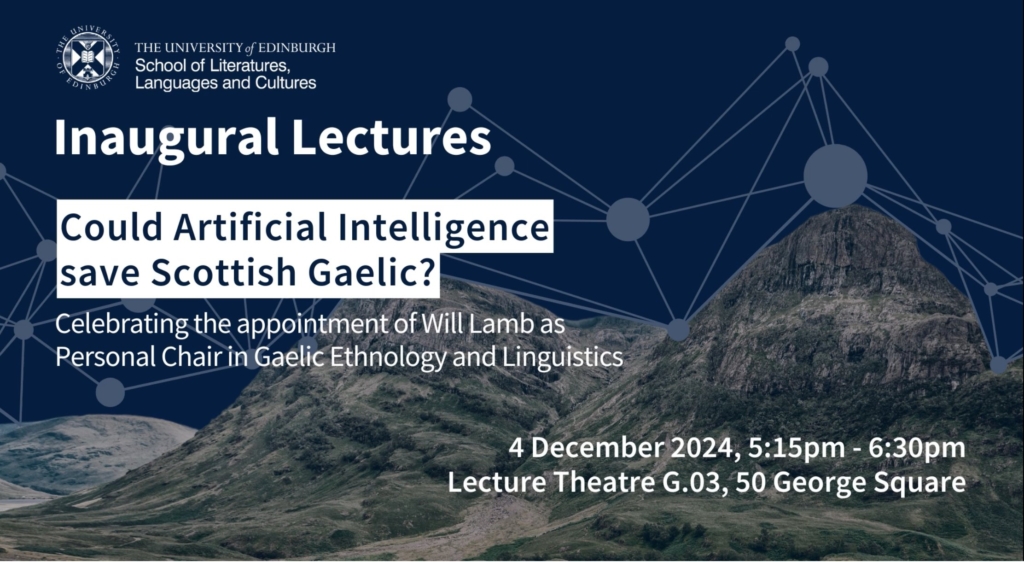Could Artificial Intelligence save Scottish Gaelic?
Inagural lecture by Will Lamb, Professor of Gaelic Ethnology and Linguistics at Edinburgh University …
|

Watch video here.
Inagural lecture by Will Lamb, Professor of Gaelic Ethnology and Linguistics at Edinburgh University …
|

Watch video here.
We don’t take any advertising, we don’t hide behind a pay wall and we don’t keep harassing you for crowd-funding. We’re entirely dependent on our readers to support us.
Don’t miss a single article. Enter your email address on our subscribe page by clicking the button below. It is completely free and you can easily unsubscribe at any time.
Initially sceptical, by the end I was convinced that AI could have an important role to play. Not so much in ‘saving Scottish Gaelic’ as in supporting its teaching by providing ‘virtual Gaelic speakers’ with whom learners can practice their conversational skills. In my limited experience as a learner the lack of such opportunities at different levels of proficiency is a real issue. As for ‘saving Scottish Gaelic’: this seems to me to be a completely different matter, requiring bold interventions in political and social policy to sustain those communities and cultural environments where Scottish Gaelic lives on.
Lots to think about from this lecture.
As I was thinking reading about AI language methods in Tom Mustill’s How to Speak Whale: A Voyage into the Future of Animal Communication, these tools make it so easy to fake and prank. And automated translation into Gaelic could be used fraudulently. I’m almost surprised there was no mention of how many Ossians could be generated.
This may be a problem of academic blinkers (certainly AI is not ‘synonymous’ with large language models outside linguistics). There tends to be an underappreciation of bad actors. Or even well-meaning amateurs (like ‘Scots Wikipedia’).
But I did appreciate the discussion of information hazards and some ethical challenges.
There was a very good point: about “no way to signpost synthetic text online”. Which is very similar to the point I made to the relevant authorities many years ago, about labelling test/parody websites and data feeds so that web provenance engines could automatically treat them differently from other kinds of sources. But I got blank indifference. Now, to me, undermining attempts to standardise resource labelling (for good actors) and reliably watermarking (against bad actors) on the web is one of the greatest scandals of our age. I mean, how much carnage has come from fake content? But I digress.
Will AI help a language progress, develop, or regress, stagnate? I think the lecture gives hints, but we need to look at the properties of each language, surely.
A recent episode of the Ottoman Empire by Train featured two figures from the Serbian enlightenment (I think these were Dositej Obradović and Vuk Stefanović Karadžić) who reformed Serbian literature and alphabet. I’m not a linguist, but perhaps now is the time to look at Scottish Gaelic and see what reforms might be beneficial before any AI-assisted boom. I can understand the Serbian approach to match phonetics 1:1 with alphabet characters; I cannot understand the Scottish Gaelic approach to orthography. Other European languages like French reinforce patriarchy in their overly-gendered language, and France is a country of appalling misogyny and crimes against women. I don’t know if Gaelic needs or could be reformed in ways to remove negative aspects of culture, but it would be cowardly not to challenge this.